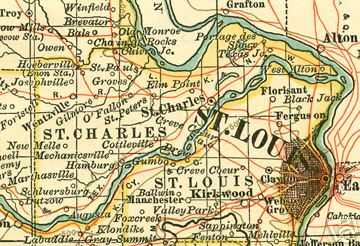Saint Louis, Mo. — Former state representative Rick Stream, the Republican nominee for St. Louis County Executive, told reporters today that he plans on pushing for legislation in the state capitol that would reduce the number of traffic tickets given out by police departments throughout St. Louis.
“Some of these numbers that are out there are pretty staggering in terms of how much city revenue is generated by traffic tickets,” Stream told reporters on a conference call. “Traffic tickets are not designed to raise revenue for a local municipality, they are there to enforce the law and have you drive safer, but they aren’t serving that function.”

State law prohibits local municipalities from collecting more than 30 percent of their total income from traffic tickets. But legal observers say the cap is riddled with loopholes and Stream said that many local cities were already in violation of the law.
Stream’s plan for reducing the number of tickets issued will begin with State Auditor Tom Schweich, who Stream wants to audit any cities suspected of violating the state cap. Stream’s proposed legislation will also designate a compliance officer for Schweich specifically for the purpose of examining ticket fines.
Stream’s proposal, much of which will come in the form of legislation in January, would lower the state cap from 30 percent to around 20 or 25 percent, Stream said.
“If you apply that 30 percent cap to the state level just to get an idea of how big it is…it would be about $1,500 per person every year in Missouri if you look at about 30 percent of the state budget, which is about $9 billion.”
Stream said that many local municipalities were using ticket schemes to collect revenue as opposed to enforcing the law, and punishing neighboring and out-of-town drivers to do it.
Stream’s proposal is largely legislative and will have to rely on his colleagues in the House and Senate of Jefferson City to put much of the language into law. But as County Executive, Stream said he would bring municipalities together to work on combining police departments and finding new funding mechanisms to replace any essential lost revenue. But Stream also said that some of that revenue may not be coming back.
“Right off the bat we need to make sure that these municipalities are collecting revenue that actually need for essential services,” Stream said.
Stream said that, under his plan, local cities found to be exceeding the 30 percent cap or a new, lower, cap, would not collect that revenue, but that the money would instead be funneled to public education.
Stream’s opponent, Democratic county councilman Steve Stenger, said Stream’s focus was sudden, and that the proposal was too late for the now term-limited representative.
“If Mr. Stream was really concerned about the traffic ticket schemes he would have addressed it when he was a State Representative instead of passing laws that allow for the open carry of assault weapons,” said Ed Rhode, a spokesperson for Stenger.
The Stream campaign released a series of bullet points outlying the proposal.
·Lower the current 30% cap, reducing how much a municipality can collect in traffic ticket revenue.
·Provide the State Auditor a compliance officer to assist them in performing compliance audits to any city suspected of exceeding the cap.
·Require municipalities to redirect any traffic ticket revenue collected above the cap or at the break-even point to fund the court system, to go to Missouri public schools.
·Establish and enforce penalties for any municipality that violates the cap and fails to surrender excessive fine revenues.
·Require a community service option for paying a traffic fine.
·Advocate for state legislation to forbid judges and prosecutors from serving in those roles in more than one city at a time
·Review feasibility of allowing the St. Louis County public defender’s office to represent low-income citizens in municipal courts where currently, they are prohibited by law from doing so and if found feasible seek legislation to authorize it.
·Use collection agencies to collect fines for minor traffic violations, instead of warrants that contribute to a vicious cycle of poverty stemming from an inability to pay the original fine, being arrested on a bench warrant and put in jail for failure to pay the original fine, thereby missing work and further falling into debt for a fine they may not have been able to pay in the first place.
·Allow defendants to bring their children with them to court in 100% of the municipal courts. Currently 37% of courts do not allow children that can cause citizens to miss their court date or pay for someone to watch their children.
Collin Reischman was the Managing Editor for The Missouri Times, and a graduate of Webster University with a Bachelor of Arts in Journalism.








